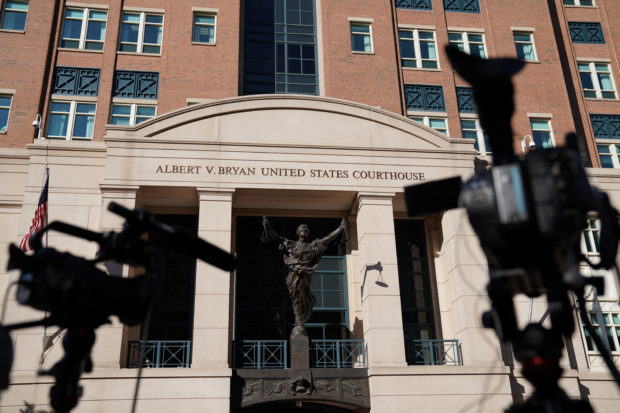
Members of the media gather outside of the Federal Courthouse as they wait for statements following the sentencing of El Shafee Elsheikh, a former British citizen and IS fighter, in Alexandria, Virginia, U.S., August 19, 2022. REUTERS/Sarah Silbiger
ALEXANDRIA, Virginia — A U.S. federal judge on Friday sentenced a member of an Islamic State (IS) cell known as “The Beatles” to life in prison for involvement in a hostage-taking plot that led to the killings of American journalists and aid workers in Syria.
Families and friends of the four Americans killed and of other hostages previously detained by the militant group looked on as District Court Judge T.S. Ellis sentenced El Shafee Elsheikh, 34, to life without parole, calling his behavior “horrific, barbaric, brutal and of course criminal.”
A jury in April concluded the former British citizen was part of an Islamic State cell, nicknamed “The Beatles” for their English accents, that beheaded American hostages in areas of the Middle East controlled by the militant group. He was found guilty on four counts of hostage-taking and four counts of conspiracy after a two-week trial.
The victims’ relatives and friends sat in the front rows of the courtroom and were visibly shaken during the course of the hearing as tears rolled down their eyes and they consoled each other. Elsheikh was sentenced to eight concurrent life sentences.
At the peak of its power from 2014-2017, Islamic State ruled over millions of people and claimed responsibility for or inspired attacks in dozens of cities around the world.
Its leader, Abu Bakr al-Baghdadi, declared a caliphate over a quarter of Iraq and Syria in 2014, before he was killed in a raid by U.S. special forces in Syria in 2019 as the group’s rule collapsed.
READ: US trial begins for members of Islamic State ‘Beatles’ cell
Elsheikh, who was born in Sudan and raised in London, was accused of conspiring to kill four American hostages: James Foley, Steven Sotloff, Peter Kassig and Kayla Mueller.
Foley and Sotloff, both journalists, and Kassig, an aid worker, were killed in videotaped beheadings. Mueller was raped repeatedly by al-Baghdadi before her death in Syria, U.S. officials have said.
The deaths of Foley, Sotloff, and Kassig were confirmed in 2014; Mueller’s death was confirmed in early 2015.
Elsheikh appeared in the federal courtroom in Alexandria, Virginia, on Friday wearing a gray jumpsuit, a face mask and glasses. Family and friends of his victims were asked to make statements in front of the judge.
“Hatred completely overtook your humanity,” Foley’s mother, Diane said, later breaking down in tears. “I pity you. I pray your time in prison will give you a time to reflect.” Friday marked the eighth anniversary of Foley’s beheading.
The head of the London police’s Counter Terrorism Command, Richard Smith, said in a statement the victims’ families “have shown remarkable fortitude and bravery in giving their accounts of what happened to investigators, and in court.”
The charges against Elsheikh, whose British citizenship was withdrawn in 2018, carried a potential death sentence, but U.S. prosecutors had previously advised British officials that they would not seek the death penalty.
Prosecutors argued that a life sentence was needed to prevent Elsheikh from causing future harm and to set a precedent that such crimes will get strict punishment.
“The Beatles were genuine psychopaths,” First Assistant U.S. Attorney Raj Parekh argued in court on Friday during the hearing, adding that Elsheikh was the highest-ranking member of the Islamic State to ever be convicted in a U.S. Court.
Another cell member, Alexanda Kotey, was sentenced to life in prison by a U.S. judge earlier this year. Kotey was held in Iraq by the U.S. military before being flown to the United States to face trial. He pleaded guilty last September to the murders of Foley, Sotloff, Kassig, and Mueller.
READ: Islamic State ‘Beatle’ pleads guilty to murdering US hostages
A third member of the group, Mohammed Emwazi, died in a U.S.-British missile strike in Syria in 2015.
Some former hostages, released by the cell after protracted negotiations, testified during trials about the torture they endured. Family members of those killed also testified.
RELATED STORIES
Two British IS ‘Beatles’ fighters captured in Syria – US official
24 dead, including six children, in spiralling Gaza violence